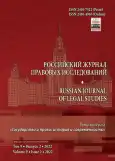Legal Regulation of Artificial Intelligence: Foreign Practices
- 作者: Matyuk Y.S.1
-
隶属关系:
- Vladivostok Institute of Economics and Service
- 期: 卷 9, 编号 2 (2022)
- 页面: 107-115
- 栏目: Review
- ##submission.dateSubmitted##: 24.12.2021
- ##submission.dateAccepted##: 15.04.2022
- ##submission.datePublished##: 18.07.2022
- URL: https://journals.eco-vector.com/2410-7522/article/view/91009
- DOI: https://doi.org/10.17816/RJLS91009
- ID: 91009
如何引用文章
详细
The rapid development and increasing use of artificial intelligence (AI) technologies bring to the fore issues related to the legal regulation of these technologies. Currently, more than 80 countries have developed conceptual and policy documents and doctrinal acts that define the framework, principles of regulation, and key guidelines for the development of digital technologies. In this context, one of the key objectives of this study is to make a comparative analysis of the international experience in the use and legal regulation of digital technologies, and in particular, AI in digital public communications. A comparative research methodology was chosen, which was used to study legal experiences of regulating AI worldwide. The doctrinal-political and ethical documents and the current regulatory legal acts of different states were analyzed. It was not possible to consider all the sources available today within the framework of this study; thus, the study was limited to the legal experiences of countries with the highest levels of development of AI technologies and their corresponding legal regulations. The results of the study showed that currently, the main legal instruments in the regulation of AI are strategies and conceptual and program acts. Their significant drawbacks are the focus on commercial purposes, problems of optimizing the management process, and provision of public services. The formation of institutions and complexes, as well as effective mechanisms for protecting the rights, freedoms, and legitimate interests of citizens and their organizations, is given very little importance. There is a global trend of transitioning from acts of a recommendatory nature to generally binding legislative regulation in this sphere. Ethical coding and professional sociotechnological standards seem to be the primary options for the social regulation of the development and implementation of AI technologies, and legal regulation is effective in the field of coding the operation of these technologies.
全文:
作者简介
Yulia Matyuk
Vladivostok Institute of Economics and Service
编辑信件的主要联系方式.
Email: 5080mm@mail.ru
ORCID iD: 0000-0003-3195-2349
SPIN 代码: 8416-3781
postgraduate student
俄罗斯联邦, 41, st. Gogol, Vladivostok, Primorsky Territory, 690014参考
- Ruchkina G, Demchenko M, Popova A et al. Teoriya pravovogo regulirovaniya iskusstvennogo intellekta, robotov i obyektov robototekhniki v Rossiyskoy Federatsii. Moscow: Prometey, 2020. 296 p. (In Russ.).
- Bittencourt N, Godoy da Costa Lima K. Assessing China’s Policy thinking on ai development. Boletim do Tempo Presente. Recife-PE. 2019;8(2):132-201.
- Butrimovich A et al. Osnovy gosudarstvennoy politiki v sfere robototekhniki i tekhnologiy iskusstvennogo intellekta. Moscow: Infotropik Media, 2019. 184 p. (In Russ.).
补充文件






